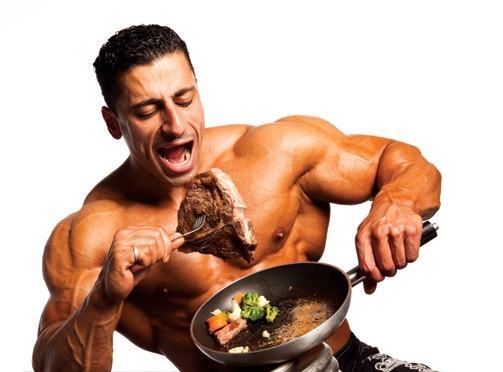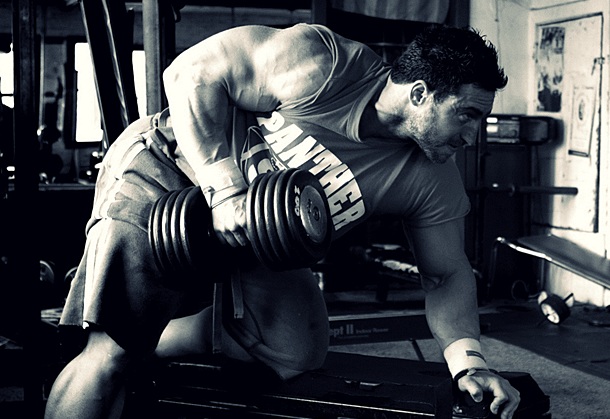 There is so much conflicting information out there when it comes to the topic of building muscle, and sometimes it can be very difficult to know where to start. If you’re an average beginner looking for some basic guidelines to follow in the gym, the following 8 points will start you off on the right track.
There is so much conflicting information out there when it comes to the topic of building muscle, and sometimes it can be very difficult to know where to start. If you’re an average beginner looking for some basic guidelines to follow in the gym, the following 8 points will start you off on the right track.
1. Train With Weights and Focus On Compound, Free Weight Movements
If you want to make solid, noteworthy gains in muscle size and strength, you absolutely must train with free weights and focus on basic, compound exercises. A compound exercise is any lift that stimulates more than one muscle group at a time. Examples of these lifts are the squat, deadlift, bench press, chin up, barbell row, overhead press, dip and lunge. Compound movements allow you to handle the most weight and will stimulate the greatest amount of total muscle fibers.
2. Be Prepared To Train Hard
One of the biggest factors that separates those who make modest gains from those who make serious gains is their level of training intensity. In order to stimulate your muscle fibers to their utmost potential, you must be willing to take every set you perform in the gym to the point of muscular fatigue and/or failure.
Muscular Failure: The point at which no further repetitions can be completed using proper form.
Sub-maximal training intensity will leave you with sub-maximal results, plain and simple.
3. Track Your Progress In The Gym From Week To Week
Our bodies build muscle because of an adaptive response to the environment. When you go to the gym, you break down your muscle fibers by training with weights. Your body senses this as a potential threat to its survival and will react accordingly by rebuilding the damaged fibers larger and stronger in order to protect against any possible future threat. Therefore, in order to make continual gains in muscle size and strength, you must always focus on progressing in the gym from week to week. This could mean performing 1 or 2 more reps for each exercise or adding more weight to the bar. Keep a detailed training log to track your progress as your strength increases over time.
4. Avoid Overtraining
Overtraining is your number one enemy when it comes to building muscle size and strength. When most people begin a workout program, they are stuck with the misguided notion that more is better. They naturally assume that the more time they spend in the gym, the better results they will achieve. When it comes to building muscle, nothing could be farther from the truth! If you spend too much time in the gym, you will actually take yourself farther away from your goals rather than closer to them. Remember, your muscles do not grow in the gym; they grow out of the gym, while you are resting and eating. Recovery is absolutely vital to the muscle growth process. If you don’t provide your body with the proper recovery time in between workouts, your muscles will never have a chance to grow.
5. Eat More Frequently

The main area where most people fail miserably on their muscle-building mission is on the all-too important task of proper nutrition. Training with weights is only half of the equation! You break down your muscle fibers in the gym, but if you don’t provide your body with the proper nutrients at the proper times, the muscle growth process will be next to impossible. You should be eating anywhere from 5-7 meals per day, spaced every 2-3 hours in order to keep your body in an anabolic, muscle-building state at all times. Each meal should consist of high quality protein and complex carbohydrates.
6. Increase Your Protein Intake
Of the 3 major nutrients (protein, carbohydrates and fats) protein is without a doubt the most important for those who are looking to gain muscle size and strength. Protein is found in literally every single one of the 30 trillion cells that your body is made up of and its main role is to build and repair body tissues. Without sufficient protein intake, it will be physically impossible for your body to synthesize a significant amount of lean muscle mass. If your body were a house, think of protein as the bricks. A general guideline is to consume 1-1.5 grams of protein per pound of body weight each day from high quality sources such as fish, poultry, eggs, beef, milk, peanut butter and cottage cheese.
7. Increase Your Water Intake
If you want a simple, easy and highly effective way to maximize your muscle gains, drinking more water is it. Water plays so many vital roles in the body and its importance cannot be overstated. In fact, your muscles alone are made up of 70% water! Not only will drinking more water cause your muscles to appear fuller and more vascular, but it will also increase your strength as well. Research has shown that merely a 3-4% drop in your body’s water levels can impact muscle contractions by 10-20%! Aim to consume 0.6 ounces for every pound of bodyweight each day for optimal gains.
8. Be Consistent!
Consistency is everything. Those who make the greatest gains in muscular size and strength are the ones who are able to implement the proper techniques on a highly consistent basis. Simply knowing is not enough, you must apply!
Building muscle is a result of the cumulative effect of small steps. Sure, performing 1 extra rep on your bench press will not make a huge difference to your overall results, and neither will consuming a single meal. However, over the long haul, all of those extra reps you perform and all of those small meals you consume will decide your overall success. If you work hard and complete all of your muscle-building tasks in a consistent fashion, all of those individual steps will equate to massive gains in overall size and strength.




